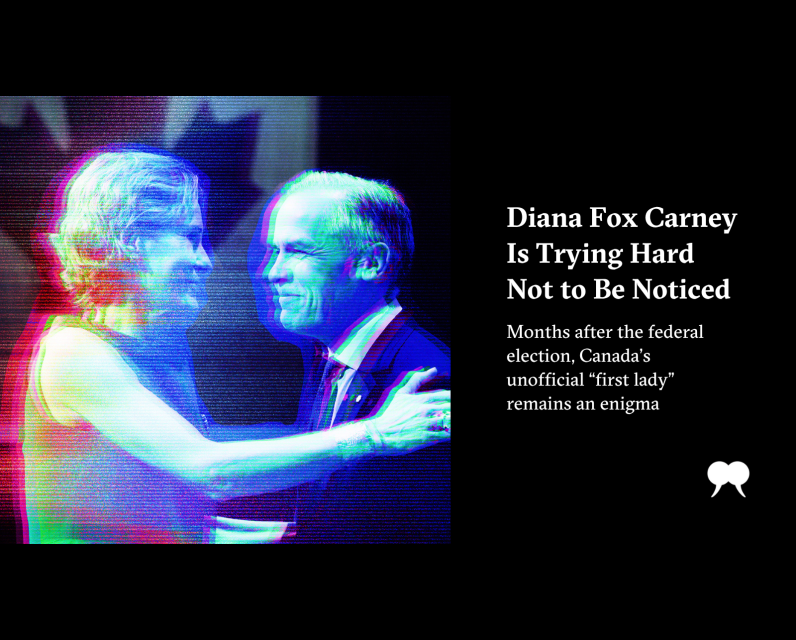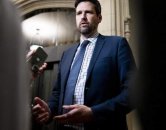Diana Fox Carney Is Trying Hard Not to Be Noticed

Diana Fox Carney has done exactly one interview since she became Canada’s “first lady” this past March—and it was a sit-down that wasn’t supposed to happen.
The ten-minute in-person conversation took place with journalist Charlie Senack on April 27, just a day before the federal election. Senack writes for multiple newspapers in the Ottawa area, including the Barrhaven Independent—a local community outlet in Nepean, where Prime Minister Mark Carney was running (and later won). Shortly after the election was called, Senack was barred from a campaign event because it was “pool coverage only”—meaning only select journalists were given access to the PM. “I said to his team that I didn’t think this was a good idea,” Senack says. He writes for residents who would be voting in his riding. “We should probably have a good relationship.”
Two hours later, the PM’s office called to apologize. “I’m, like, if you want to make it right, you’re going to have to give me an interview with Mark Carney,” he says. As the campaign dragged on, it became clear the interview wasn’t happening. Then came the call: no PM—but maybe a sit-down with Carney’s wife.
After some back and forth came the confirmation: Fox Carney was in. “I was told this is the only interview she’ll be doing, as she doesn’t like doing them,” Senack says.
But behind that reluctance was a résumé that suggested she would have plenty to say. An alumna of the University of Oxford—where she met the future PM—Fox Carney studied philosophy, politics, and economics. She holds a master’s degree in agricultural economics from Oxford and another master’s, in international relations, from the University of Pennsylvania. She’s also widely respected as an expert on global climate and energy policy.
The interview, however brief, offered a glimpse into her own political instincts and the Carney campaign’s ground game. Acting as “his eyes and ears” in Nepean while her husband criss-crossed the country, she knocked on doors daily, calling the riding “friendly” and diverse—“it’s got every community here.” Asked about her ties to the area, a less affluent suburb than the family’s own Ottawa neighbourhood, she replied, “I’ve been in and out of Nepean for twenty years,” citing her kids’ hockey tournaments. Though new to retail politics, she came across as enthusiastic, well briefed, and strategically deployed.
The interview appeared to double as a soft launch for her public role: part surrogate, part character witness, part co-pilot. And in a race where Carney’s national profile left him somewhat distant from local concerns, her presence seemed engineered to bridge that gap.
Some questions were off limits. During the campaign, stories had circulated about one of the Carney children. “I was told I couldn’t ask about the kids for that reason,” says Senack. One wonders if the recirculated 2013 photos of the Carneys at a British music festival alongside convicted sex offender Ghislaine Maxwell—the former partner of the late disgraced financier Jeffrey Epstein—have also had something to do with the hesitancy to grant an interview. Fox Carney’s sister and Maxwell were reported to have gone to high school together. Perhaps Fox Carney was concerned that the Maxwell association might come up.
Personal interviews can certainly be intimidating, especially if you aren’t used to them. And in a world where some first ladies can be eager performers, Fox Carney stands out. “I don’t think she likes being the centre of attention,” says Senack.
The role of first lady can be daunting. You’re very visible, often politicized, and bound by expectations of grace and restraint while under constant scrutiny. Most wives have time to ease into it, adjusting gradually as their spouses build campaign teams and gear up for a run. That wasn’t the case for Fox Carney. Former PM Justin Trudeau didn’t leave office in disgrace, but the circumstances leading up to his resignation came about abruptly. Last December, few could have predicted that Fox Carney’s husband would be his successor come March and then take the election a month later. She was thrust into the spotlight almost overnight.
Eliza Reid knows how that feels. The former first lady of Iceland was thrown into her new job when her husband, Guðni Thorlacius Jóhannesson, took office as president in 2016. The Panama Papers—leaked documents exposing how the global elite hide their wealth in offshore accounts—had ensnared then prime minister Sigmundur Davíð Gunnlaugsson, who had failed to disclose that he and his wife owned an offshore company. The scandal led to his resignation, propelling incumbent president Ólafur Ragnar Grímsson to bow out of the election. As Jóhannesson provided calm, insightful commentary on television, the public took notice. Encouraged by the response, he ran for office—and won.
Reid, who was born in Ottawa and raised close to the capital city, became the first lady of a country she had adopted—just like Fox Carney. “It all happened over a period of seven weeks, so very, very suddenly,” Reid tells me from her home in a suburb outside Reykjavik.
There are a number of stresses that come with being the spouse of a world leader, says Reid. The first is superficial. Female spouses of world leaders undergo a scrutiny male counterparts bypass. “There was my clothing and image,” she says. “It’s not my forte or my interest.” Reid’s thought process was: “I want to serve well and everything, but I don’t even know how to dress.’”
Fox Carney, a mother of four, had to contend with the same thing. Within weeks of her husband’s election, fashion magazines contrasted her “no-nonsense” fashion sense with that of the stylish Sophie Grégoire Trudeau. But fashion, for first ladies, is never just fashion—it ends up being a form of signalling. And for political watchers, even understated choices can seem to offer insight into policy values. Fox Carney’s well-toned silhouette could be said to suggest a disciplined, pragmatic side; her clothes are more about movement than ornament. She’s fond of tennis: the Carneys have been spotted at Wimbledon in the past. But she’s also an avid hockey fan, who met her husband through the sport while both were students at Oxford. She played forward; he was a goaltender. The university’s ice hockey club once described her as someone who could “skate rings around her opponents and move effortlessly through the opposing line.”
That mix of athletic grit and quiet polish was probably honed long before Oxford: she attended Marlborough College, the same boarding school that Catherine, the princess of Wales, went to. “She’s British, but she’s not like the ‘snobby British,’” says Senack. “She didn’t give me that energy at all.”
The energy Fox Carney does radiate is that of an “eco-warrior,” a label given to her by the Telegraph—one that she picked up for her environmental expertise and long-standing activism. She was previously the vice president of Canada 2020, a self-styled “independent progressive think-tank.” She has chaired climate funds and has been on the boards of several charities, such as Save the Children. (She joined Eurasia Group—political risk forecasters for businesses, investors, and governments—as a senior adviser in 2021, working under Vice Chairman Gerald Butts, former principal secretary to Justin Trudeau.)
Whatever interest Fox Carney has in fashion seems focused on pushing responsible supply chains and resisting consumerism. In 2012, she said that “having more stuff doesn’t make us happy,” adding that she has “seen first-hand the devastation that our willful refusal to challenge consumerist habits is wreaking on marginal communities.”
But advocacy comes with complications—especially for a political spouse. “If you’re choosing to be active and talking about things, you put yourself up for criticism,” says Reid, who participated on panels and gave keynote addresses. “At the same time, you’re not the one elected to a position.” The former first lady gives the example of being asked for help several times on any given issue: it could be an ask for her to push for a certain legislation or to push back against one. “It was usually something that had nothing to do with what I was doing.”
Perhaps the most jarring shift for Reid was realizing she was suddenly defined by her marriage. “While I’m proud to be my husband’s wife, I don’t consider it my defining characteristic as a human being,” she says. It’s a public adjustment other political spouses know well. Last year, in our interview for her book Closer Together, Grégoire Trudeau bristled at how people projected a role onto her. “A lot of people asked me in the beginning if I was going to be okay being the wife of somebody,” she told me. “I said, ‘I’m not the wife of anybody!’”
But resisting the label doesn’t always mean escaping the expectations that come with it. In 2019, Reid wrote a New York Times piece about her own frustrations with the stereotypes foisted on first ladies—which include acting as “window dressing” for their husbands’ politics. Female spouses, as Reid put it, are expected to showcase the “lighter side of the Force.”
Senack’s interview with Fox Carney is a case in point: she describes a man who devours books, chases new bands, and fumbles chores. “I’m not going to say he’s the most practical person around the house,” she quips about the technocrat now moving through Canadian politics with the cold focus of someone bent on remaking it in his image.
Perhaps part of the mystery surrounding Fox Carney is in how inaccessible she seems. Selective in appearances, uninterested in the limelight, she doesn’t appear to currently have a social media presence other than her LinkedIn account. “My speculation is that she will have more of a back-feet role during her husband’s reign,” says Senack. “She prefers to stay on the sidelines.”
But there are also signs that she’s warming up to her situation. The last time Senack saw her in person was during King Charles’s official visit to Ottawa for the speech from the throne in May. “The impression I got was that she seemed very comfortable.” Similarly, Senack says, she was engaged and animated at the Canada Day event in Nepean. “I feel like she does better with smaller settings and crowds, one on one.” In her first official function as wife of the PM, Fox Carney hosted a luncheon for the spouses of G7 leaders in Alberta in June.
Fox Carney may be finding her footing in a space that male political spouses are almost never expected to tread. Flip the script and the expectations vanish. Hillary Clinton joked that if she became president, she’d still pick the flowers for the state dinner; pundits puzzled over what a first gentleman’s job even was; and when then vice president Kamala Harris ran against Donald Trump, a columnist mused whether her husband Doug Emhoff’s suits were likely to make the cover of Vogue.
Defining yourself outside your spouse’s job feels like its own political act. Before her husband took office, Reid was an editor of Icelandair’s in-flight magazine. She had also co-founded a writer’s retreat. “It was very top of mind that I didn’t allow Eliza to disappear in that whole adventure,” she says. She also worked on a Nordic noir mystery novel, Death on the Island, which came out this past April. During her husband’s time in office, Reid also wrote a non-fiction book on Iceland’s “sprakkar”—or famous women. It was an extension of her advocacy work for gender equality.
Like Reid, Grégoire Trudeau used her platform to amplify a cause she was passionate about: mental health. Laureen Harper, the wife of former PM Stephen Harper, had planned to keep a low profile but then became vocal on, among other issues, organ donation. Margaret Trudeau, the ex-wife of former PM Pierre Trudeau (and, later, mother to the younger Trudeau), actively engaged in political campaigning—something that hadn’t been the case for her predecessors. She spoke at public events, introduced Trudeau at rallies, and backed local candidates in tightly contested ridings.
With her impressive academic and professional credentials, Fox Carney has just as much to offer. There could be areas of conflict—for instance, why Fox Carney isn’t translating her environmental expertise to the new position. “Maybe because the role itself is an ill-defined one, it means that the solutions, and how to navigate it, is also ill-defined,” Reid points out.
Indeed, perhaps Fox Carney’s inactivity could be strategic because of how politicized the climate crisis has become. Case in point: her husband axed the carbon tax as soon as he took office. And with the passing of the controversial Bill C-5, many Indigenous leaders and opposing politicians are upset at the law’s powerful potential to weaken environmental protections already in place.
But even if there isn’t any conflict of interest, is it imperative that Fox Carney be more involved? “I’ve always seen it as a personal choice,” says Reid. “We have to remember that she’s not the one who ran for office. I chose to be very active and to speak up, but I don’t think people should be under an obligation to do that. If we want to make it compulsory for spouses of world leaders to do these things, then I think we should pay them.”
In this way, being a first lady in Canada is fundamentally different from being one in the US, where the position, while unofficial, comes with an office and staff. In Canada, the prime minister’s spouse has no formal role or institutional support, and technically isn’t even the partner of a head of state. As a result, the title “first lady” doesn’t really apply in the same way.
Reid has already lived through what comes after. Jóhannesson chose not to seek a third term in 2024 and returned to academia. Reid has mixed feelings about that part of her life being over. “I’m glad I don’t have to wear makeup as much,” she quips.
For now, Fox Carney seems content to keep things low-key and play ceremonial sidekick, appearing when protocol demands it. “I think the way she views it,” says Senack, “is she will do her duty when called upon, but he’s the one who signed up to be prime minister.”
Technically, it is early days, so of course, a lot could still happen. “I’d be curious to see if anything changes,” says Senack. Who knows? She might just follow suit and make her own mark on the role after all.
The post Diana Fox Carney Is Trying Hard Not to Be Noticed first appeared on The Walrus.



Comments
Be the first to comment